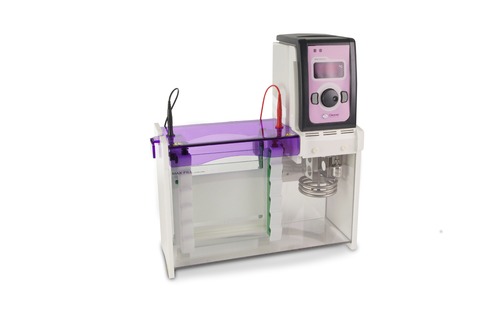
The OmniPAGE VS20WAVE-DGGE from Cleaver Scientific is a flexible Denaturing Gradient Gel Electrophoresis (DGGE) system.
Modular in design, the system can be simply adapted to perform most single-base pair mutation detection techniques that are used in DNA mutation analysis.
Denaturing gradient gel electrophoresis (DGGE) is a molecular fingerprinting method that separates polymerase chain reaction-generated DNA products.
The polymerase chain reaction (PCR) of environmental DNA can generate templates of differing DNA sequence that represent many of the dominant microbial organisms.
However, since PCR products from a given reaction are of similar size (bp), conventional separation by agarose gel electrophoresis results only in a single DNA band that is largely non-descriptive.
DGGE can overcome this limitation by separating PCR products based on sequence differences that results in differential denaturing characteristics of the DNA.
Incorporating proprietary vertical screw-clamp technology, the VS20WAVE-DGGE is fully equipped with temperature control unit, stirrer and gradient mixer and casting accessories - enabling it to perform Heteroduplex analysis (HA), Parallel Denaturing Gradient Gel Electrophoresis (DGGE) and Constant Denaturing Gradient Gel Electrophoresis (CDGE).
The system includes a powerful microprocessor-controlled PID temperature control unit that enables various mutation detection techniques to be undertaken between ambient temperature and 70°C with an accuracy of 0.02°C.
A GM100 gradient mixer ensures efficient gradient formation by mixing and delivering high and low-density denaturant solutions.
Cleaver Scientific's vertical screw clamp technology is designed to make gel casting assembly simpler and faster.
VS20WAVE-DGGE can easily switch between different mutation detection techniques to maximise throughput and screening efficiency.
The system is compatible with microplates and thermal cycler blocks enabling 96-sample throughput which alleviates many of the bottlenecks associated with screening for DNA mutations.




